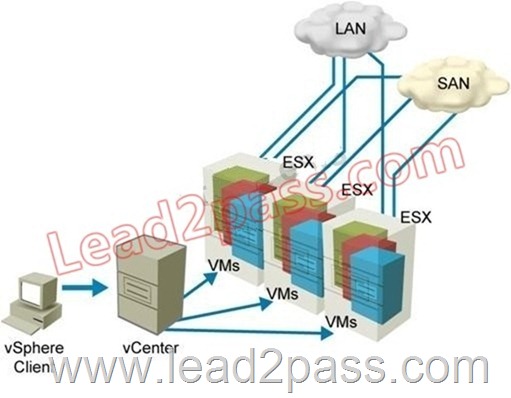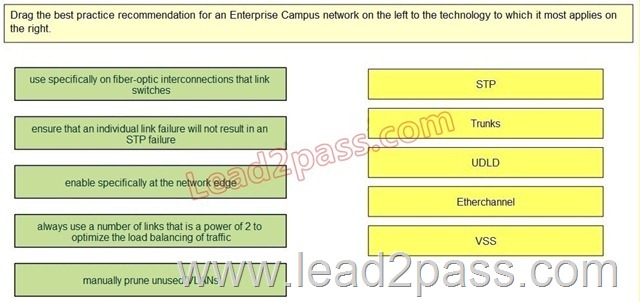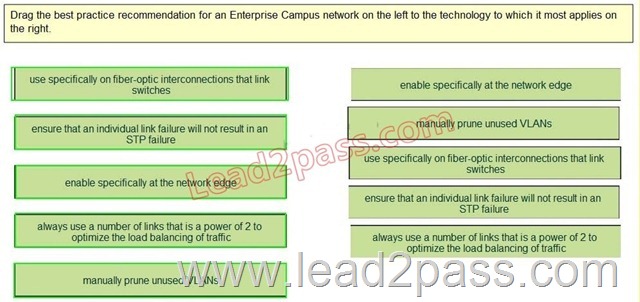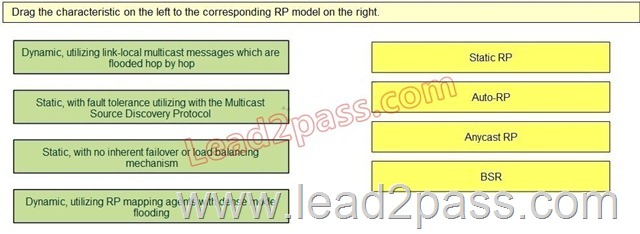2016 December Cisco Official New Released 300-320 Dumps in Lead2pass.com!
100% Free Download! 100% Pass Guaranteed!
Cisco 300-320 exam is very popular in Cisco field, many Cisco candidates choose this exam to add their credentials. There are many resource online to offering Cisco 300-320 exam questions, through many good feedbacks, we conclude that Lead2pass can help you pass your test easily with Cisco 300-320 exam questions. Choose Lead2pass to get your Cisco 300-320 certification.
Following questions and answers are all new published by Cisco Official Exam Center: http://www.lead2pass.com/300-320.html
QUESTION 181
An engineer is designing an address plan. Which IPv6 prefix removes any consideration regarding the number of hosts per subnet?
A. /32
B. /48
C. /64
D. /96
Answer: C
QUESTION 182
Two recently merged companies are using EIGRP and RIP. Which two strategies can facilitate a smooth migration? (Choose two.)
A. Create an OSPF instance between EIGRP and RIP routing domains.
B. Redistribute routing information between the RIP and EIGRP protocols.
C. Add EIGRP and then remove RIP on the acquired company network.
D. Use the EIGRP administrative distance to migrate one site at a time.
E. Use static routes in place of dynamic routing between companies.
Answer: BC
QUESTION 183
Two companies recently merged and want to integrate their networks. Both utilize EIGRP to support their complex enterprise networks. Which action can improve the performance of these two separate EIGRP domains?
A. Enable route summarization at redistribution points.
B. Adjust the administrative distance to prefer the best routes to each destination.
C. Remove EIGRP and utilize OSPF instead.
D. Utilize EIGRP stub routing between the network boundaries of the companies.
Answer: A
QUESTION 184
Which IPv4 multicast technical component measure provides architectural security?
A. IGMP max groups
B. access lists
C. scoped addresses
D. state limit
Answer: C
QUESTION 185
Which option is the primary reason to implement security in a multicast network?
A. maintain network operations
B. allow multicast to continue to function
C. optimize multicast utilization
D. ensure data streams are sent to the intended receivers
Answer: A
QUESTION 186
Refer to the exhibit. Which Layer 2 feature detects a link failure between the switch and router B that decreases OSPF reconvergence to approximately 50 milliseconds?
A. BFD
B. UDLD
C. RSTP
D. PVST+
Answer: A
QUESTION 187
Which of the following facts must be considered when designing for IP telephony within an Enterprise Campus network?
A. Because the IP phone is a three-port switch, IP telephony extends the network edge, impacting the Distribution layer.
B. Video and voice are alike in being bursty and bandwidth intensive, and thus impose requirements to be lossless, and have minimized delay and jitter.
C. IP phones have no voice and data VLAN separation, so security policies must be based on upper layer traffic characteristics.
D. Though multi-VLAN access ports are set to dot1q and carry more than two VLANs they are not trunk ports.
Answer: D
QUESTION 188
Addressing QoS design in the Enterprise Campus network for IP Telephony applications means what?
A. It is critical to identify aggregation and rate transition points in the network, where preferred traffic and congestion QoS policies should be enforced
B. Suspect traffic should be dropped closest to the source, to minimize wasting network resources
C. An Edge traffic classification scheme should be mapped to the downstream queue configuration
D. Applications and Traffic flows should be classified, marked and policed within the Enterprise Edge of the Enterprise Campus network
Answer: A
QUESTION 189
The requirement for high availability within the Data Center network may cause the designer to consider which one of the following solutions?
A. Construct a hierarchical network design using EtherChannel between a server and two VDCs from the same physical switch
B. Utilize Cisco NSF with SSO to provide intrachassis SSO at Layers 2 to 4
C. Define the Data Center as an OSPF NSSA area, advertising a default route into the DC and summarizing the routes out of the NSSA to the Campus Core
D. Implement network services for the Data Center as a separate services layer using an active/active model that is more predictable in failure conditions
Answer: B
QUESTION 190
When designing remote access to the Enterprise Campus network for teleworkers and mobile workers, which of the following should the designer consider?
A. It is recommended to place the VPN termination device in line with the Enterprise Edge firewall, with ingress traffic limited to SSL only
B. Maintaining access rules, based on the source IP of the client, on an internal firewall drawn from a headend RADIUS server is the most secure deployment
C. VPN Headend routing using Reverse Route Injection (RRI) with distribution is recommended when the remote user community is small and dedicated DHCP scopes are in place
D. Clientless SSL VPNs provide more granular access control than SSL VPN clients (thin or thick), including at Layer7
Answer: D
QUESTION 191
Which three statements about firewall modes are correct? (Choose three.)
A. A firewall in routed mode has one IP address.
B. A firewall in transparent mode has one IP address.
C. In routed mode, the firewall is considered to be a Layer 2 device.
D. In routed mode, the firewall is considered to be a Layer 3 device.
E. In transparent mode, the firewall is considered to be a Layer 2 device.
F. In transparent mode, the firewall is considered to be a Layer 3 device.
Answer: BDE
QUESTION 192
Which two of these correctly describe asymmetric routing and firewalls? (Choose two.)
A. only operational in routed mode
B. only operational in transparent mode
C. only eight interfaces can belong to an asymmetric routing group
D. operational in both failover and non-failover configurations
E. only operational when the firewall has been configured for failover
Answer: CD
QUESTION 193
Which of the following two statements about Cisco NSF and SSO are the most relevant to the network designer? (Choose two.)
A. You can reduce outages to 1 to 3 seconds by using SSO in a Layer 2 environment or Cisco NSF with SSO in a Layer 3 environment.
B. SSO and NSF each require the devices to either be graceful restart-capable or graceful restart- aware.
C. In a fully redundant topology adding redundant supervisors with NSF and SSO may cause longer convergence times than single supervisors with tuned IGP timers
D. The primary deployment scenario for Cisco NSF with SSO is in the Distribution and Core layers.
E. Cisco NSF-aware neighbor relationships are independent of any tuned IGP timers
Answer: AC
QUESTION 194
Refer to the exhibit. Which of the following two are advantages of Server virtualization using VMware vSphere? (Choose two) 
A. Retains the one-to-one relationship between switch ports and functional servers
B. Enables the live migration of a virtual server from one physical server to another without disruption to users or loss of services
C. The access layer of the network moves into the vSphere ESX servers, providing streamlined vSphere management
D. Provides management functions including the ability to run scripts and to install third-party agents for hardware monitoring, backup, or systems management
E. New functional servers can be deployed with minimal physical changes on the network
Answer: BD
QUESTION 195
Which of the following two are effective and simple means of employing route summarization within the Enterprise Campus network? (Choose two)
A. A default route (0.0.0.0 /0) advertised dynamically into the rest of the network
B. Route filtering to manage traffic flows in the network, avoid inappropriate transit traffic through remote nodes, and provide a defense against inaccurate or inappropriate routing updates
C. Use manual split horizon
D. Use a structured hierarchical topology to control the propagation of EIGRP queries
E. Open Shortest Path First (OSPF) stub areas
Answer: AE
QUESTION 196
From a design perspective which two of the following OSPF statements are most relevant? (Choose two)
A. OSPF stub areas can be thought of as a simple form of summarization
B. OSPF cannot filter intra-area routes
C. An ABR can only exist in two areas – the backbone and one adjacent area
D. Performance issues in the Backbone area can be offset by allowing some traffic to transit a non-backbone area
E. The size of an area (the LSDB) will be constrained by the size of the IP MTU
Answer: AB
QUESTION 197
OSPF stub areas are an important tool for the Network designer; which of the following two should be considered when utilizing OSPF stub areas? (Choose two)
A. OSPF stub areas increase the size of the LSDB with the addition of Type 3 and 5 LSAs
B. OSPF not so stubby areas are particularly useful as a simpler form of summarization
C. OSPF stub areas are always insulated from external changes
D. OSPF totally stubby areas cannot distinguish among ABRs for the best route to destinations outside the area
E. OSPF stub areas can distinguish among ASBRs for destinations that are external to the OSPF domain
Answer: CD
QUESTION 198
Which two protocol characteristics should be most considered when designing a single unified fabric for the Data Center? (Choose two.)
A. FCIP or FCoE allow for easier integration by using the Fibre Channel Protocol (FCP) and Fibre Channel framing
B. iSCSI uses a special EtherType and an additional header containing additional control information
C. FCIP and iSCSI has higher overhead than FCoE owing to TCP/IP
D. FCoE was initially developed to be used as a switch-to-switch protocol, while FCIP is primarily meant to be used as an access layer protocol to connect hosts and storage to a Fibre Channel SAN
E. FCoE requires gateway functionality to integrate into an existing Fibre Channel network
Answer: AC
QUESTION 199
Drag and Drop Question
Drag the best practice recommendation for an Enterprise Campus network on the left to the technology to which it most applies on the right.
Answer:
QUESTION 200
Drag and Drop Question
Answer:
Cisco 300-320 exam questions are available in PDF and VCE format. This makes it very convenient for you to follow the course and study the exam whenever and wherever you want. The Cisco 300-320 exam questions follow the exact paper pattern and question type of the actual 300-320 certification exam, it lets you recreate the exact exam scenario, so you are armed with the correct information for the 300-320 certification exam.
300-320 new questions on Google Drive: https://drive.google.com/open?id=0B3Syig5i8gpDdnA2R2ZwUDFuY2M
2016 Cisco 300-320 exam dumps (All 356 Q&As) from Lead2pass:
http://www.lead2pass.com/300-320.html [100% Exam Pass Guaranteed]




